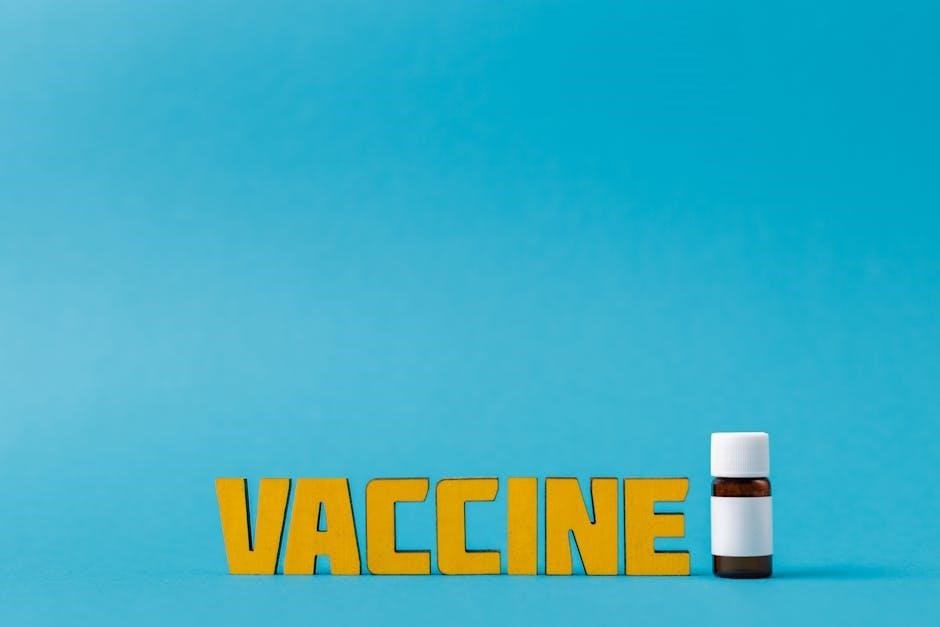Understanding Flu Vaccine Exemption Letters in New Jersey
Flu vaccine exemption letters in New Jersey are official documents that outline reasons for exemption from mandatory vaccination․ They are typically required for medical or religious reasons and must be submitted formally to relevant authorities․ These letters are crucial for individuals or employers seeking compliance with state health regulations while accommodating personal beliefs or health conditions․ Understanding the process and requirements is essential for ensuring valid exemptions․
1․1 Overview of Flu Vaccine Exemption Letters
Flu vaccine exemption letters in New Jersey are formal documents that allow individuals to opt out of mandatory influenza vaccinations due to medical or religious reasons․ These letters must adhere to state-specific guidelines and are typically submitted by healthcare providers or religious leaders․ They serve as legal proof of exemption, ensuring compliance with public health policies while respecting personal beliefs or health conditions; Proper documentation is essential for validity․
1․2 Importance of Exemption Letters in New Jersey
Flu vaccine exemption letters in New Jersey are legal documents that allow individuals to opt out of mandatory influenza vaccinations due to medical or religious reasons․ These letters are essential for ensuring compliance with state health regulations while respecting personal beliefs or health conditions; They provide a formal way to balance public health policies with individual rights, making them a crucial tool for schools, employers, and healthcare systems․ They also offer legal protection for those who cannot or choose not to be vaccinated, ensuring their rights are upheld․

Process for Obtaining a Flu Vaccine Exemption in New Jersey
Obtaining a flu vaccine exemption in New Jersey involves submitting a formal request, providing required documentation, and meeting specific criteria․ The process ensures compliance with state health regulations while accommodating individual circumstances․
2․1 Steps to Request an Exemption
To request a flu vaccine exemption in New Jersey, individuals must follow specific steps․ First, review the eligibility criteria for medical or religious exemptions․ Next, obtain the appropriate exemption form, such as the Influenza Medical Exemption Form or a religious affidavit․ Complete the form accurately and have it signed by a healthcare provider if required․ Submit the form through approved methods, such as mail, fax, or online portals, and retain a copy for personal records․
2․2 Submission Methods for Exemption Requests
Exemption requests in New Jersey must be submitted in writing through approved methods․ Individuals can mail, fax, or use online portals to submit their forms․ The Influenza Medical Exemption Form (PDF) and religious affidavits are available online․ Submissions via phone or email are generally not accepted․ Ensure all documents are completed accurately and signed by authorized personnel, such as healthcare providers, to avoid delays in processing․

Medical Exemptions for the Flu Vaccine
Medical exemptions for the flu vaccine are granted for specific health conditions verified by a healthcare provider․ They must be documented using official forms from the New Jersey Department of Health․
3․1 Criteria for Medical Exemptions
Medical exemptions for the flu vaccine in New Jersey are based on specific medical conditions that prevent vaccination․ These include severe allergies to vaccine components, weakened immune systems, or prior adverse reactions․ A licensed healthcare provider must verify the condition and provide detailed documentation․ The exemption must align with state health guidelines and be submitted using the Influenza Medical Exemption Form (PDF)․ Each case is reviewed individually to ensure eligibility․

3․2 Required Documentation and Forms
To obtain a medical exemption, individuals must submit the Influenza Medical Exemption Form (PDF), signed by a licensed healthcare provider․ This form verifies the medical condition preventing vaccination․ Additional documentation, such as medical records or test results, may be required to support the exemption claim․ The form must be completed accurately and submitted to the appropriate health authority․ Confidentiality is maintained to protect personal health information throughout the process․
Religious Exemptions for the Flu Vaccine
Religious exemptions allow individuals to opt out of flu vaccinations due to bona fide religious beliefs․ Legal precedents, such as Frazee v․ Illinois, support such exemptions․ A detailed affidavit may be required to validate the request, ensuring compliance with both health regulations and personal faith principles․
4․1 Role of Religious Beliefs in Exemptions
Religious beliefs play a central role in flu vaccine exemptions, allowing individuals to opt out based on sincere faith-based objections․ These exemptions are protected under laws like Title VII, which prohibits religious discrimination․ To qualify, individuals must demonstrate that their beliefs are genuinely held and conflict with vaccination․ A formal affidavit or letter detailing these beliefs is typically required to support the exemption request․
4․2 Legal Precedents Supporting Religious Exemptions
Legal precedents, such as Frazee v․ Illinois and Fowler v․ Rhode Island, establish that sincere religious beliefs can justify vaccine exemptions․ These cases affirm that employers and institutions must accommodate such beliefs under anti-discrimination laws, including Title VII․ Courts have consistently upheld the right to religious exemptions, provided the beliefs are bona fide and not merely personal objections․ This legal framework protects individuals seeking exemptions based on faith in New Jersey․
Confidentiality and Privacy in Exemption Requests
Confidentiality and privacy are critical when submitting exemption requests․ Personal and medical information must be protected to prevent unauthorized access or misuse․ Employers and institutions are legally obligated to maintain the confidentiality of exemption documents, ensuring privacy rights are upheld throughout the process․
5․1 Maintaining Confidentiality of Requests
Maintaining confidentiality of flu vaccine exemption requests is crucial to protect personal and medical information․ Employers and institutions must ensure that exemption documents are stored securely and accessed only by authorized personnel․ Confidentiality prevents unauthorized disclosure and potential misuse of sensitive information․ Legal standards and privacy laws, such as HIPAA, govern the handling of such records, ensuring that personal rights are respected throughout the exemption process;
5․2 Reasons for Ensuring Privacy
Ensuring privacy in flu vaccine exemption requests is vital to protect sensitive personal and medical information․ Privacy safeguards prevent unauthorized access and potential misuse of exemption details․ It also upholds individuals’ rights to keep their health and religious beliefs confidential․ Legal standards, such as HIPAA, reinforce these protections, ensuring that personal information remains secure and respected throughout the exemption process․ Privacy fosters trust and prevents discrimination or misuse of exemption status․

Legal Considerations and Workplace Implications
Legal considerations involve workplace discrimination concerns and frameworks governing exemptions in New Jersey, ensuring fair handling of flu vaccine exemption requests in professional settings․
6․1 Legal Framework Governing Exemptions
The legal framework in New Jersey outlines specific criteria for granting flu vaccine exemptions, ensuring compliance with both state and federal laws․ Employers must adhere to Title VII of the Civil Rights Act for religious exemptions and the Americans with Disabilities Act (ADA) for medical accommodations․ These laws mandate reasonable accommodations unless they pose an undue hardship․ New Jersey’s guidelines ensure equitable handling of exemption requests, balancing public health and individual rights;
6․2 Addressing Workplace Discrimination Concerns
In New Jersey, employers must avoid discrimination when handling flu vaccine exemption requests․ Under Title VII of the Civil Rights Act, employers cannot retaliate against employees for requesting religious exemptions․ Similarly, the ADA prohibits discrimination based on medical conditions requiring exemptions․ Employers are advised to maintain confidentiality and ensure fair treatment to prevent legal disputes․ Clear communication and consistent policies help mitigate workplace discrimination concerns effectively․

State-Specific Resources and Guidance
New Jersey provides specific resources for flu vaccine exemptions, including the Health Department’s exemption forms and local support centers offering guidance and assistance․
7․1 New Jersey Health Department Resources
The New Jersey Health Department offers detailed resources for flu vaccine exemptions, including downloadable PDF forms for medical and religious exemptions․ These documents outline eligibility criteria, required signatures, and submission guidelines, ensuring compliance with state regulations․ The department also provides contact information for inquiries and support, making the exemption process accessible and transparent for residents․ These resources are regularly updated to reflect current health policies and legal requirements․
7․2 Local Support and Information Centers
Local support centers in New Jersey provide guidance on flu vaccine exemptions, offering access to forms, community resources, and step-by-step instructions․ Libraries, health clinics, and community centers often serve as hubs for distributing exemption-related materials․ These local resources help individuals navigate the exemption process, ensuring they understand requirements and deadlines․ They also connect residents with legal and medical professionals for further assistance, making the process more accessible and user-friendly․

Key Takeaways for Flu Vaccine Exemptions
Understanding eligibility, documentation, and submission processes is crucial․ Ensure compliance with New Jersey regulations while respecting individual rights․ Stay informed to navigate exemptions effectively and responsibly;
8․1 Summary of Essential Considerations
When seeking a flu vaccine exemption in New Jersey, it’s crucial to understand eligibility criteria, documentation requirements, and submission processes․ Ensure compliance with state regulations while respecting individual rights․ Verify the validity of medical or religious reasons, as these are primary grounds for exemptions․ Maintain confidentiality to protect personal information․ Stay informed about legal frameworks and workplace policies to navigate the process smoothly and avoid potential disputes or complications․
8․2 Final Thoughts on Exemption Processes
Obtaining a flu vaccine exemption in New Jersey requires careful consideration of medical, religious, or personal reasons․ Ensure compliance with state regulations and maintain confidentiality throughout the process․ Understanding the legal framework and workplace policies is essential to avoid disputes․ Stay informed about resources and support available, such as those from the New Jersey Health Department․ By adhering to guidelines and submitting proper documentation, individuals can navigate the exemption process effectively and responsibly․
9․1 Recap of the Exemption Process
The exemption process involves determining eligibility based on medical or religious reasons, obtaining the appropriate forms from the New Jersey Health Department, and ensuring proper submission․ Forms must be completed accurately, signed by relevant authorities, and submitted through approved methods like online portals, mail, or fax․ Maintaining confidentiality and adhering to state guidelines are crucial․ This process ensures balance between public health concerns and individual rights, providing a structured pathway for exemptions․
9․2 Importance of Understanding Exemption Options
Understanding exemption options is crucial for making informed decisions about flu vaccination requirements․ It ensures individuals and employers can navigate medical and religious exemptions effectively, preventing potential discrimination; Knowledge of legal frameworks and documentation requirements helps maintain compliance while respecting personal beliefs and health needs․ This understanding fosters a balance between public health goals and individual rights, ensuring exemptions are granted fairly and appropriately in New Jersey․
